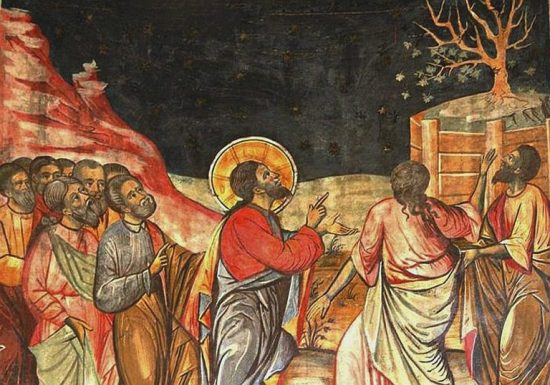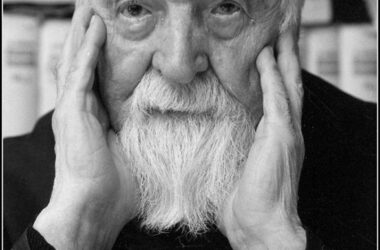Jesus Curses a Fig Tree
12 The next day as they were leaving Bethany, Jesus was hungry. 13 Seeing in the distance a fig tree in leaf, he went to find out if it had any fruit. When he reached it, he found nothing but leaves, because it was not the season for figs. 14 Then he said to the tree, “May no one ever eat fruit from you again.” And his disciples heard him say it.
15 On reaching Jerusalem, Jesus entered the temple courts and began driving out those who were buying and selling there. He overturned the tables of the money changers and the benches of those selling doves, 16 and would not allow anyone to carry merchandise through the temple courts. 17 And as he taught them, he said, “Is it not written: ‘My house will be called a house of prayer for all nations’[c]? But you have made it ‘a den of robbers.’[d]”
18 The chief priests and the teachers of the law heard this and began looking for a way to kill him, for they feared him, because the whole crowd was amazed at his teaching.
19 When evening came, Jesus and his disciples[e] went out of the city.
20 In the morning, as they went along, they saw the fig tree withered from the roots. 21 Peter remembered and said to Jesus, “Rabbi, look! The fig tree you cursed has withered!”
22 “Have faith in God,” Jesus answered. 23 “Truly[f] I tell you, if anyone says to this mountain, ‘Go, throw yourself into the sea,’ and does not doubt in their heart but believes that what they say will happen, it will be done for them. 24
The proof of the unseen things
Clement of Alexandria, Stromata, 2nd Stromata, Cap. II, 8.4., 9.1.-9.7., in Church Fathers and Writers (1982), vol. 5, p. 118
The faith which is blasphemed by the Greek who consider it vain and barbarian is a voluntary acceptance, it is a consent of honoring God, it is confidence in what is hoped, proof of the invisible things, according to what the holy apostle says that especially by this one those of yore received testimony (Hebrews 11, 1-2).
But without fait hit is impossible to please God (Hebrews 11, 6) Others defined the faith as a consent which unites us with an invisible thing just as the proof is a visible consent of an unknown thing. Faith is a spiritual state; this spiritual state is the beginning of an action, what follows is that faith is the beginning of action, a conscious foundation of the spiritual state; by faith is received in anticipation the proof.
It is a beginning of wisdom to attach of what it is useful for you. A spiritual state without interruptions offers a great support to gnosis (knowledge) Thus the practice of faith becomes science set on a solid ground. The philosophers define science as a discipline which can`t be shaken by reason. Is it there any other true state like this one beside the faith in God having as the only master the Word? I don`t think so. Teophrastus says that feeling is the beginning of faith; and from feeling the beginnings of faith extend to the reason and mind which are found in our soul.
Source: http://ziarullumina.ro






